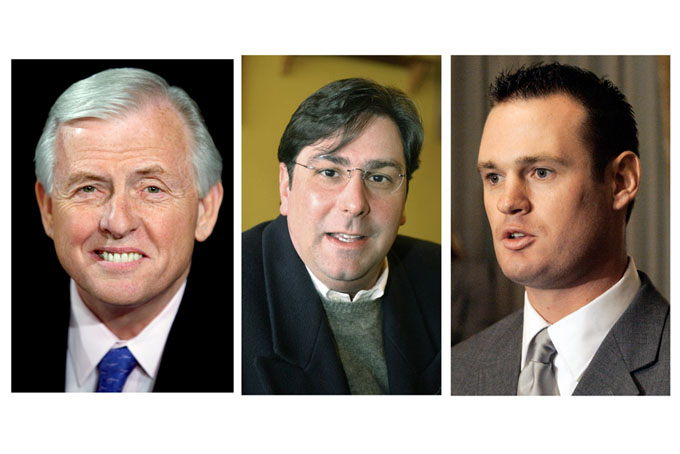
This combination of three file photos shows, left, then state Auditor General Jack Wagner in Philadelphia on Friday, May 7, 2010. The center photo shows Bill Peduto in a file photo from March, 2005. The photo at right is a 2006 file photo of Luke Ravenstahl, the incumbent mayor of Pittsburgh who is not seeking re-election. (AP Photos/Wagner/Matt Rourke, Peduto-Ravenstahl /Keith Srakocic)
by Joe Mandak
PITTSBURGH (AP) — Mayor Luke Ravenstahl’s decision not to seek re-election has given whoever succeeds him an opportunity to shine a national spotlight on a city that continues to reinvent itself as a post-industrial 21st century success story, say political experts and the leading candidates to replace him.
And in heavily Democratic Pittsburgh, which hasn’t elected a Republican mayor since the Great Depression, that successor is likely to be crowned in Tuesday’s primary, in which former state Auditor General Jack Wagner and City Councilman Bill Peduto are badly outpacing two other Democrats, state Rep. Jake Wheatley and community activist A.J. Richardson.
“We can have the re-establishment of Pittsburgh right now, in this race, rather than waiting until someone wins” in November, said Joseph Sabino Mistick, a law professor and longtime Pittsburgh political pundit.
Ravenstahl, 33, became the youngest mayor of a major American city in September 2006 when, as a 26-year-old City Council president, he automatically succeeded Mayor Bob O’Connor, who died of brain cancer.
The “young mayor” label landed Ravenstahl interviews on CNN, CBS’s “Late Show With David Letterman” and other outlets, and seemingly limitless momentum to continue transforming a cash-strapped, once-mighty industrial center into a world leader in medical and technical research.
But personal and political scandals have derailed the mayor’s role in all that.
Ravenstahl divorced his high-school sweetheart — saying she didn’t care for the political spotlight — yet has repeatedly been burned by its glare himself, appearing glassy-eyed in photos posted on night-life blogs and disappearing at a ski resort the weekend a deadly blizzard crippled the city in February 2010.
Ravenstahl announced he wouldn’t run again in March, blaming speculation about a federal grand jury investigation into police finances and related media hound-dogging for sucking the fun out of his job and taking a toll on his family.
Since then, federal prosecutors have charged Ravenstahl’s former police chief with creating, then stealing from a slush fund fed by fees the city collects when officers work off-duty security details. Now prosecutors appear to be focusing on Ravenstahl, calling his secretary and two bodyguards before a grand jury and subpoenaing records for the mayor’s home improvements by a contractor whose other company has done $2.2 million worth of work for the city.
Ravenstahl denies wrongdoing and his attorney has said he’s not been told the mayor is target of the investigation. But the damage has been done.
“He had everything going for him, and he blew it in a lot of different ways, personally, politically and professionally,” said Jon Delano, a political analyst and reporter for KDKA-TV, the city’s CBS affiliate.
But Delano and Mistick said Ravenstahl’s self-ouster gives primary voters a chance to reinvigorate the city’s profile.
The mayor’s office has also shrunk under Ravenstahl, the political experts said, with both hoping a “bigger” mayor like David L. Lawrence, Richard Caliguiri or even Sophie Masloff will emerge.
Lawrence, for whom the city’s convention center is named, was mayor from 1946 to 1959 before becoming governor. He presided over the city’s post-war boom and was a visionary who positioned the region for economic redevelopment. After the steel industry bust, Caliguiri deftly managed the city’s 1980s decline before dying in office as a beloved father figure and giving way — as O’Connor did to Ravenstahl — to Masloff.
The screechy-voiced Jewish grandmother drew laughs for her out-of-touch pop culture malapropisms — referring to Bruce Springsteen as “Bruce Bedspring,” and the Grateful Dead as “the Dreadful Dead” — but remains the city’s political matriarch at age 95.
Delano and Mistick agreed that Wagner and Peduto both have the personalities and tools to become the next strong mayor of a city clearly on the upswing.
Despite its still-hefty corporate presence — including H.J. Heinz Co., U.S. Steel and charitable foundations fueled by the fortunes of those companies and others —the city’s future appears to be its “meds and eds” and tech industries. They’re driven by the University of Pittsburgh Medical Center, a pioneer in research and organ transplantation; and Carnegie Mellon University, renowned for its robotics and computer science programs and partnerships with Google Inc., among others.
But Wagner and Peduto offer huge stylistic differences in managing those resources and city government.
“Jack Wagner’s approach will be steady as you go. He has the breadth and background to run city government and will be all about, ‘Let’s bring in good people and we’ll make Pittsburgh work again,'” Delano said.
“You need to work with others, you need to work with the City Council, you also need to work and have an agenda in front of the state government and the federal government,” said Wagner, 65, by far the more traditional candidate.
Peduto, 48, argues that city government isn’t just broken, it is decreasingly relevant, at least in terms of the political power needed to continue transforming the city.
“It’s not a top-down power structure,” he said. “You need to decentralize the power.”
Peduto believes in empowering community groups and making room for smaller, startup companies rather than kowtowing to the city’s larger corporate entities.
“The next great chapter in Pittsburgh’s history is turning that model upside down,” he said. “That’s what the mayor can do: change the power structure of the city.”